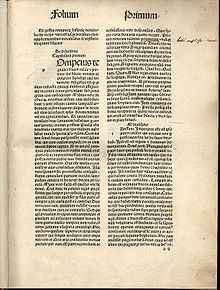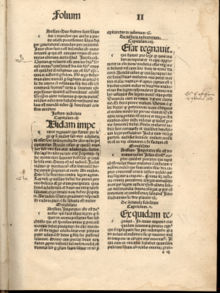Gesta Romanorum
The Gesta Romanorum (German: The Deeds of the Romans ) are a late medieval collection of examples , which was widely distributed in varying shapes from the first half of the 14th century until the Baroque .
content
The scope of the Gesta Romanorum varies in the manuscripts and includes up to 240 moralized examples , i.e. H. exemplary narratives with an appended moralizing interpretation. The title of the collection, Deeds of the Romans , indicates the interest in providing the stories with a reference to Roman history, even if the narrative material is often invented or comes from Greek, Biblical or Oriental tradition. The "moralizatio", which is regularly added to the actual narrative, gives the narrated action an allegorical interpretation by explaining within the framework of the Christian doctrine of virtue and sin, how the reader / listener has to apply it to his own actions. The Gesta Romanorum are thus in the general tradition of medieval collections of examples, such as those represented by Petrus Alfonsi or The Seven Wise Masters , and whose primary task was to provide suitable material for the sermon.
The Gesta Romanorum offer a wide variety of topics and stories that have evidently been widely collected : “In addition to ancient material ( Medusa , Perseus , Pyramus and Thisbe , Odysseus and the Sirens, Alexander the Great , Apollonius of Tire ) there is a paraphrase of the Old Testament Book of Esther , the story of the prophet Elisha who heals leprosy , the story of the murder of Siseras by Jaël , the Christian legends of Alexius , Julianus Hospitator , Gregorius and Eustachius , fables ( Androclus and the lion ), the story of the serpent on the bosom of their savior , fluctuating stories such as B. from the imaginary sick, descriptions of knightly tournaments and much more. "
Origin and reception
The core of the anonymous collection of ancient stories and medieval legends was probably written in Latin at the end of the 13th and beginning of the 14th centuries. The history of its origins and material is in the dark, especially since the Latin compilations in the various European regions differed just as much as the subsequent national language versions and their prints since the 15th century. For example, the Faits des Romains (13th / 14th centuries) with stories about Julius Caesar formed their own French tradition.
A large part of the extremely numerous Latin manuscripts were written in the south of the German-speaking area. Versions in German, Dutch, English, French, Czech, Polish, Russian and Hungarian have been found since the end of the 14th century, with German arrangements forming the most extensive group in the late Middle Ages.
Until well into the 16th century, the Gesta were available in print in almost all European languages and were very popular. Giovanni Boccaccio and William Shakespeare, for example, as well as Hans Sachs , used the Gesta Romanorum as a collection of material and a rich source for their literary work.
Example text
“Justum iudicium Capitulum III
Quidam imperator regnavit qui statuit pro lege quod si mulier sub viro adulterata esset sine misericordia de alto monte precipitaretur. Accidit casus quod quedam mulier sub viro suo erat adulterata. Statim secundum legem de alto monte erat precipitata. Sed de monte tam suaviter descendit quod in nullo lesa erat. Ducta est ad iudicium. Iudex videns quod mortua non esset sententiam dedit (eam) iterum precipitari et mori. Ait mulier: Domine si sic feceritis contra legem agitis. Lex vult quod nullus debet to puniri pro uno delicto. Ego eram precipitata quia semel adulterata et deus me miraculose salvavit: Ergo iterato non debeo precipitari. Ait iudex: Satis prudenter respondisti vade in pace. Sic salvata est mulier.
Moralization
Carissimi. Imperator iste est deus noster qui facit istam legem quod si quis in anima pollutus fuit sub Christo qui est sponsus anime per peccatum mortale debet precipitari de alto monte id est de regno celesti. Sicut erat primus pater Adam. Sed deus per filii sui passionem salvavit. Homo cum peccat deus non statim propter infinitam suam misericordiam eum damnat sed per gratiam suam salvat ut non precipitaretur in infernum. "
"A Just Judgment, Chapter 3
There was an emperor who passed a law that an adulterous woman should be thrown from a high mountain without pity. It so happened that a certain woman broke allegiance to her husband. Immediately, according to the law, she was thrown from a high mountain. But she slid down the mountain so gently that she wasn't hurt anywhere. She was taken to court. When the judge saw that she was not dead, he passed judgment that she should be thrown down again and die. Then the woman said: Lord, if you do that, you are acting against the law. The law does not want anyone to be punished twice for a crime. I was felled for one time marriage and God saved me wonderfully. So I'm not allowed to be dropped again. The judge replied: You answered quite cleverly. Go in peace. So the woman was saved.
Moral:
Dear Ones! That emperor is our God, who by law decreed that anyone who before Jesus, the wife of the soul, defiles it because of mortal sin from a high mountain, i.e. H. to be thrown down from the heavenly kingdom. This is what happened to the first father, Adam. But God saved him through the suffering of his Son. When a person sins, God in his immeasurable goodness does not immediately condemn him, but saves him by his grace, so that he will not be thrown into hell. "
Sites of famous fabrics
- Cape. 81 On the miraculous grace of God and the birth of the blessed Pope Gregory (Gregor-Roman): Thomas Mann The Elect
- Cape. 89 On the threefold course of the world: Gotthold Ephraim Lessing Nathan the Wise , ring parable
- Cape. 108 On keeping a promise true: Schiller The Guarantee
- Cape. 153 Of temporal affliction, which will finally turn into eternal joy (Apollonius novel): William Shakespeare Perikles, Prince of Tire
- First appendix chap. 10 From Emperor Lucius, as well as second appendix chap. 17: Boccaccio Decameron X, 1 and Shakespeare The Merchant of Venice
- Second appendix chap. 2: Shakespeare King Lear
(Chapter indications and headings according to Gesta Romanorum. Die Taten der Römer. A story book of the Middle Ages. Ed. By HE Rübesamen based on the translation by JTG Grasse, Munich (Goldmann), n.d. Due to the many different editions of the Gesta Romanorum, these are correct Chapter details do not exactly match those of other editions. The same applies to the titles, sometimes also to the names of the emperors to which the respective chapter refers.)
expenditure
- Winfried Trillitzsch (Ed.): Gesta Romanorum. - Stories from the Romans. A narrative book of the Middle Ages. For the first time in full translation. Insel-Verlag, Leipzig 1973
- Rainer Nickel (ed.); Gesta Romanorum , Latin – German, Philipp Reclam jun. GmbH & Co., Stuttgart 1991, ISBN 3-15-008717-1 .
literature
- Udo Gerdes: Gesta Romanorum . In: Autorlexikon , Vol. 3, 1981, Col. 25-34.
- Udo Wawrzyniak: Gesta Romanorum . In: Encyclopedia of Fairy Tales . Concise dictionary for historical and comparative narrative research . Founded by Kurt Ranke. 11 volumes. Berlin and New York 1977-2003, Vol. 5, Sp. 1201-1212.
Web links
- Manuscripts of the Gesta Romanorum in Manuscripta Mediaevalia
- Manuscripts of the Gesta Romanorum German in the manuscript census
- Gesta Romanorum in the complete catalog of incunabula
- Gesta Romanorum - Strasbourg printing of "not after 1486" in the complete catalog of incandescent prints (GW number GW10894)
- Selection in the Bibliotheca Augustana ( Latin )
- E-text based on the 1890 edition of Dick
- Editions from 1482 and 1488 digitized
- Gesta Romanorum . Ulrich Zell , Cologne after 1472. ( digitized version )
- Publications on the Gesta Romanorum in the Opac der Regesta Imperii
- Johann Georg Theodor Grässer : Gesta Romanorum, the oldest book of fairy tales and legends of the Christian Middle Ages . 3rd edition, unchanged reprint Leipzig: Löffler, Alicke 1905. from: Zeno.org , accessed on August 30, 2017.
Remarks
- ↑ The print from 1488 linked here (see "Weblinks") is, according to the general catalog of Wiegendrucke (GW), Vol. IX, a reprint of the Schott print shown here, which Johann Grüninger , also in Strasbourg, made in the same type set that he made probably taken over from Schott.
- ^ F. Wagner: Lexicon of the Middle Ages , Vol. 4, Col. 1408

